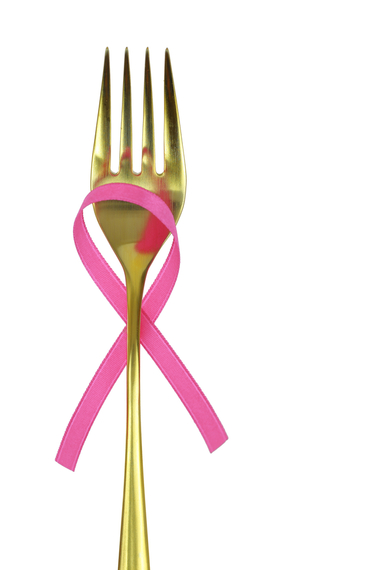
October is breast cancer awareness month. Breast cancer is diagnosed in over 220,000 women each year in the US. With one in eight or 12.3 percent of women being diagnosed, what can we do to prevent breast cancer or at the very least reduce our risk?
We have all heard the saying, "You are what you eat." If we can control breast cancer through our diet and healthy living, we can focus more on prevention as a viable means to reduce the incidence of this common cancer affecting so many of our family and friends.
Diets High in Animal Fat
The Nurses' Health Study II showed "premenopausal women who ate diets high in animal fat had a 40 to 50 percent higher risk of breast cancer compared to women who ate less animal fat."
Red meat and high-fat dairy intake may increase levels of estrogen which may also increase the risk of breast cancer recurrence and survival. Other studies have shown the post-menopausal age group who consumed high fat diets also had a higher risk of breast cancer. Studies from China showed reducing animal-based foods and dietary fat from 24 percent to six percent lowered the breast cancer risk. The "good" fats include monounsaturated (olive oil, avocados, peanut butter) and polyunsaturated (salmon, flaxseed, nuts) fats while the "(very)bad" fats include saturated (high-fat meat, butter, dairy) and trans (fried foods, commercially baked snacks &pastries) fats. Omega-3 fish oil, a polyunsaturated fat, has also been shown to lower the risk of breast cancer. Reducing animal-based foods and dietary fat, especially saturated fats to less than 10 percent of daily calories, will lower your breast cancer risk.
Plant Foods Boost our Immune System
There is convincing evidence showing a diet rich in an assortment of plant foods such as whole grains, legumes, vegetable and fruits will drastically lower rates of cancer. To keep it simple, the more colorful your selection of fruits and vegetables are, along with whole grains and legumes, the more resilient and strong your immune system. Chemical found in plant food help protect against cancer including the phytoestrogens-isoflavones, coumestans and lignans. Other immune boosting nutrients found in a plant rich diet include vitamin C, E and D, B vitamins, especially folate, vitamin A (beta carotene) and phytochemicals contained in tomatoes and coffee. Researchers recommend eating a variety of plant-based foods can lower your cancer risk by at least 20 percent.
Alcohol Consumption-How much is too much?
We know drinking alcohol increases your risk of heart disease, liver disease, high blood pressure, diabetes and colorectal cancer. Now we can add breast cancer to the negative effects of excessive alcohol consumption. It has been found having two or more drinks a day increases the chance of developing breast cancer as much as 41 percent. Even moderate alcohol intake which consists of one alcoholic drink a day or more slightly increases your risk of breast cancer. If you drink moderate amounts of alcohol it's recommended to take 600mcg of folate to counteract the effects moderate alcohol consumption has on breast cancer.
Physical Activity
Regular weekly exercise involving at least 2 ½ hours a week of moderate-intensity (even brisk walking!) has been shown to reduce your risk of breast cancer. We already know physical activity helps to maintain a healthy weight, reduces body fat, increases lean muscle mass, strengthens the immune system and improves our mental and emotional well-being.
Obesity
Obesity affects 27 percent of people in the US. Being overweight and obese increases your risk for heart disease, diabetes, high blood pressure and strokes. Additionally for women there is an established association with obesity to breast, ovarian, uterine and colon cancer. Weight control is an essential part of good health. Ideally you want your BMI to be < 25 for optimal health. Obesity has been identified as an independent risk factor for developing breast cancer. Obesity or having a BMI > 30 increases your risk of breast cancer by 33 percent in both pre- and postmenopausal women. Obesity is quickly overtaking tobacco as a leading "preventable" cause of cancer. The World Health Organization estates that more than 1 billion people worldwide are overweight or obese. Do you know your BMI?
Soy
Soy is an ideal protein that comes in the form of beans and legumes. Different forms of soy include whole beans, flour and commonly processed in soy-milk, tofu, cheese, soybean oil, yogurt and miso. The nutritional benefits of soy depends on if is processed or not. In the United States the majority of soy consumed is in the form of processed soy which has less nutritional value. When Chinese women were studied it was found when soy foods were consumed during adolescence premenopausal women had some protection against breast cancer. The effects of soy intake as an adult are less clear and more research is needed to understand the true relationship.
Vitamin D and Calcium
Vitamin D and calcium have been shown to have a role in the prevention of breast cancer. Studies found women who consumed higher amounts of vitamin D and calcium from dairy products reduced their risk of breast cancer. Newer studies have shown a connection between low Vitamin D levels and breast cancer recurrence and shortened survival. The daily recommended intakes of dietary calcium are 1000mg. The vitamin D daily recommended intake of 600IU's is debatable since studies show higher amounts of vitamin D are necessary to achieve the cancer prevention benefits. Getting your vitamin D level check is the first step in knowing how much supplementing is needed to optimize what some refer to as the "wonder vitamin."
The three most important things you can do to reduce your risk of breast cancer and other major diseases include a colorful plant-based diet, limiting alcohol consumption and controlling your weight. It's about time we start to look at prevention of breast cancer as opposed to early detection.